Key takeaways:
- Half of all employed respondents are still working from home.
- The pandemic has more negatively affected Gen Z than the other generations.
- Watching TV/Netflix is one method to de-stress that all generations can agree on.
- Three-quarters of respondents are getting enough sleep and feeling rested frequently.
- Overall, a flexible schedule is more important to Millennials and Gen X than a higher salary.
One year after global lockdowns began due to the COVID-19 pandemic, about half of employed Americans are still working from home, according to respondents to this survey. But, even before the pandemic, work-life balance was becoming increasingly important. Granted, working in the same environment in which you live does come with advantages, including the lack of a commute and suit and tie, as well as less office small talk. However, challenges inevitably arise — and they’re affecting generations differently based on variations like career level, field and whether you have kids.
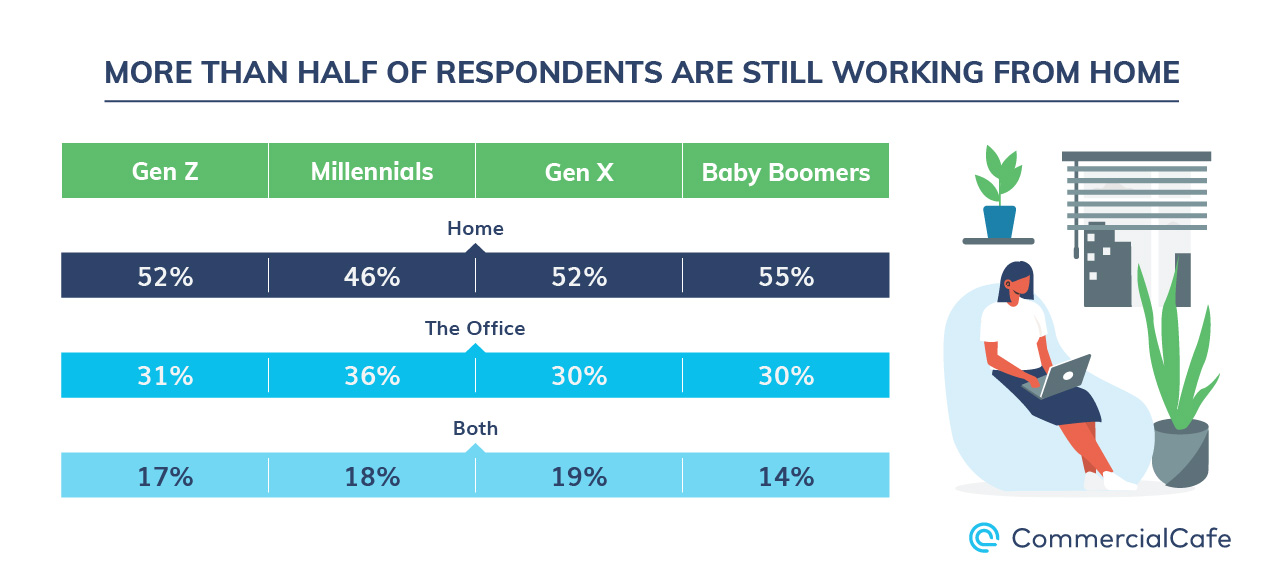
Typically, work-life balance has taken a back seat to climbing the ladder, hustle culture and standing out, especially for younger generations. Certainly, the younger you are, the more mental capacity and energy you have to dedicate yourself to your career. And why not? Gen Z and younger Millennials haven’t started collecting mortgages and kids yet.
However, most Millennials and the generations before them have already done those things — or are, at least, starting to — and they’re noticing that work isn’t as important as it used to be. Enter work-life balance, where workers realize that the absence of a good balance between work and home life can lead to declines in one or both areas.
So, because the nature of work has been turned on its head in the last year, we decided to see just how balanced our lives had become. Specifically, we surveyed 1,496 employees across various generations, as well as marital and familial situations in the U.S. and asked them just how balanced they felt their lives were now compared to before the pandemic. To gauge this, respondents told us about their satisfaction with work in the last year, how work stress affects their home life, how much they sleep, what they use to destress and more.
Of the respondents, 41% were married with children, while 41% were single. Unsurprisingly, 85% of Gen Zers reported being single while more than half of respondents from the other generations were married. As expected, the likelihood of having children at home decreased with age.
Nine in 10 Millennials and eight in 10 Gen Xers were employed full-time, whereas 60% of Gen Zers and 56% of Baby Boomers maintained a full-time job. Interestingly, it appears that freelancing and project-based employment are more popular at the beginning and end of careers, which makes sense. Many of us start our careers with little direction and will take odd jobs in the general direction of our interests. These jobs tend to be entry-level, and we begin to climb the ladder. Then, toward the end of a hopefully successful career, we can retreat a bit and use our accumulated knowledge and expertise to consult or advise others on a more part-time basis.
Overall, 75% of respondents reported being employed full-time and averaging more than 42 hours per week, with some working many more hours. All fields were represented in the survey, with the largest being IT, finance, manufacturing, retail, education and healthcare. Conversely, with a higher propensity to be part-time, Gen Z and Baby Boomers were less likely to work overtime. In fact, 51% of Gen Zers respondents reported working overtime at least monthly, with 40% of Baby Boomers working overtime at least monthly. By comparison, 64% of Millennials and 57% of Gen Xers were working overtime on a monthly, weekly or even daily basis.
Gen Z May Miss the Office More Than Other Generations
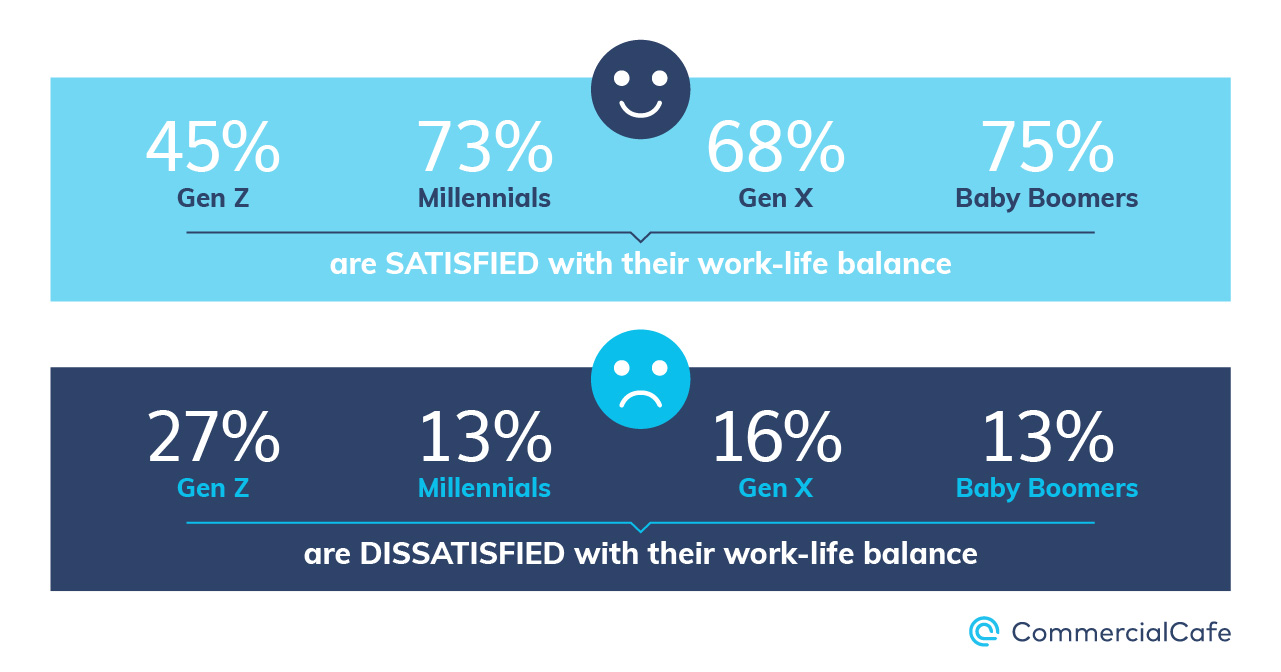
Across all generations, more than half of respondents are working from home. But, while most reported that their work-life balance was equal to or better than it was before, Gen Zers were generally less-satisfied compared to the other generations. What’s more, the transition to working from home also appeared to affect Gen Zers more adversely than it did the others. 37% of Gen Z respondents reported a deterioration in work-life balance since the pandemic began. By comparison, Millennial and Gen X respondents were more likely to be satisfied with their work-life balance, at 42% and 38%, respectively.
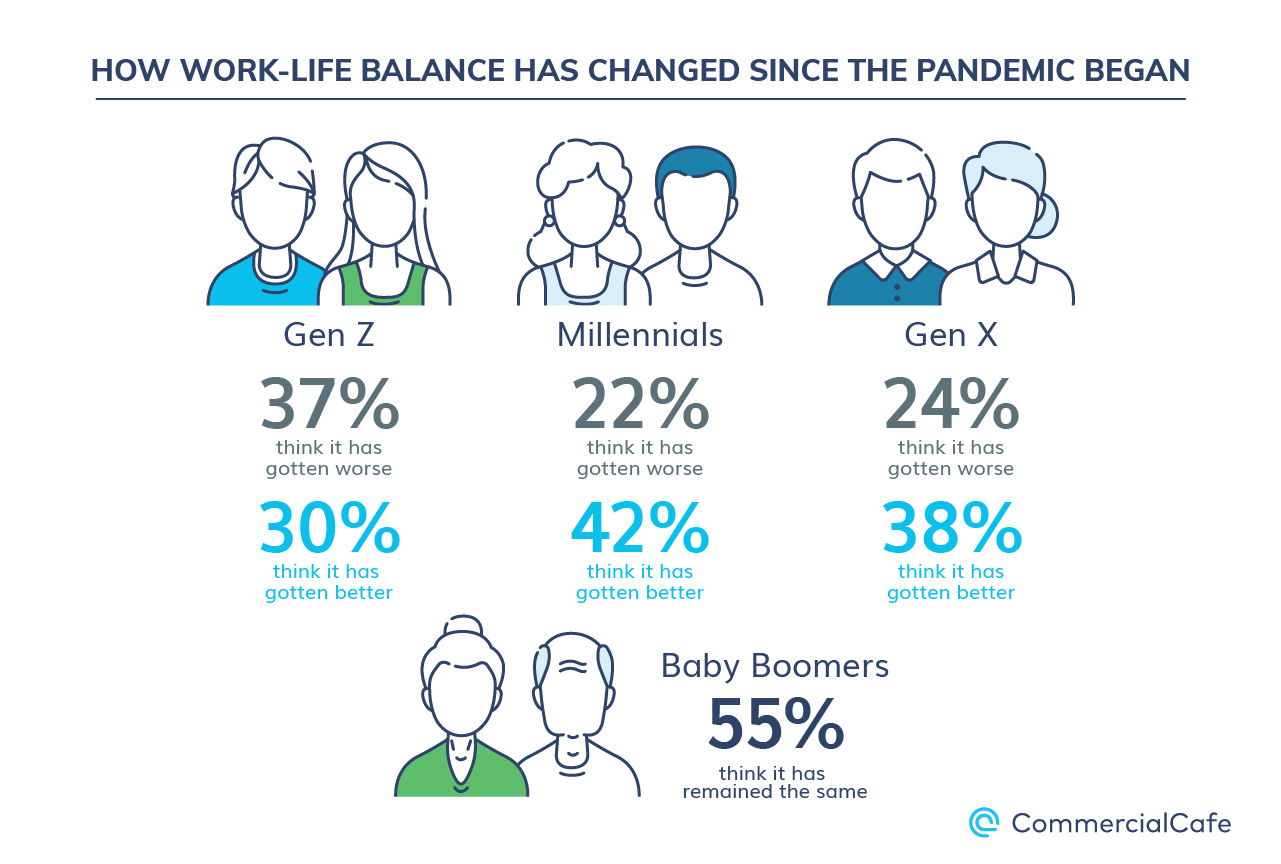
Interestingly, 55% of Baby Boomers — who are more likely to work part-time relative to Millennials or Gen Xers — haven’t experienced a change in their work-life balance whatsoever. One theory for this is that Gen Z is just entering the workforce and establishing themselves. Normally, these entry-level jobs are a proving ground for new hires under the visible supervision of superiors. But, clearly, that’s not what’s happening right now. So, proving yourself falls exclusively to the work product. However, career progression is also about building relationships and, in some industries, it’s even more important than the work. Unfortunately, building trust and developing a rapport with senior employees and management just can’t happen as easily through Zoom calls, emails and yearly reviews.
Alternatively, Millennials, Gen Xers and Baby Boomers are typically more stable in their careers and are likely a few more rungs up the ladder — or at the top. They’ve already made it through the initiation phase; developed relationships with their coworkers, subordinates and superiors; and gotten comfortable with the work prior to the pandemic. On the other hand, Gen Z had to go home during this phase and, as a result, they’re missing out on opportunities to rub shoulders with higher-ups and learn the ins and outs of office politics.
The Older You Are, the Less Stress You Have
Missing opportunities is extremely stressful and, naturally, this stress bleeds into our personal lives. The more stress you feel at work, the more likely you are to bring it home with you — which is even easier to do when working from home. Furthermore, the rate at which stress from work affects our personal lives is almost a perfect linear progression by generation, with Baby Boomers respondents feeling the least stress and Gen Z feeling the most. Indeed, 56% of Gen Zers bring some or a lot of stress from work home with them. On the flip side, 66% of Baby Boomers have a home life that is largely free of work stress. Along the same lines, more than half of both Millennials and Gen Xers are leaving stress from work at work.
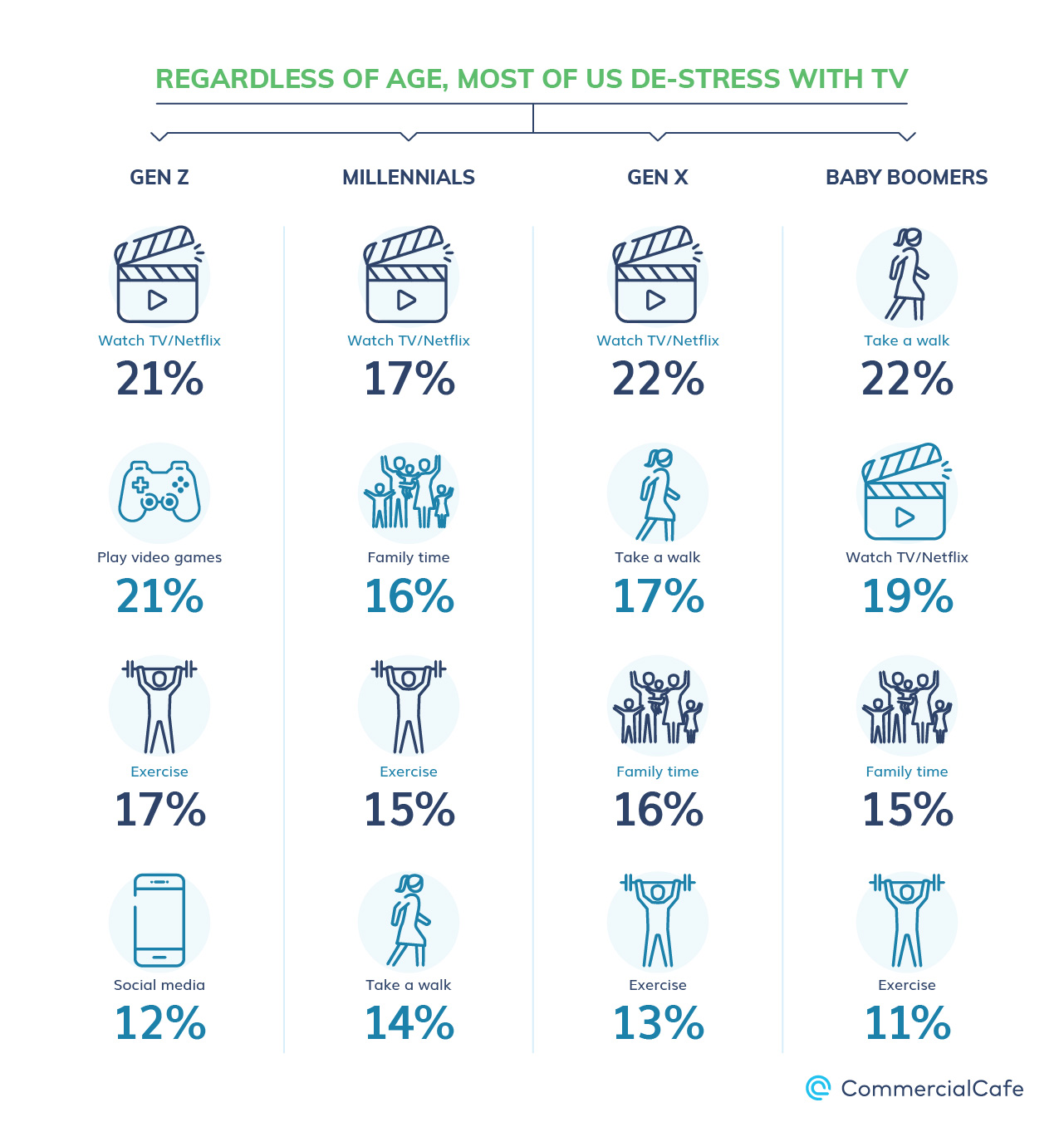
With all that stress, we need to find a way to let it go, and each generation handles it a little bit differently. While taking walks and spending time with family were more likely to be the choices of Gen Xers and Baby Boomers, video games and social media were the choices of Gen Zers. But there’s one relaxing activity that every generation seemed to enjoy — watching TV/Netflix. From verbal stories in ancient times to books, radio, cable TV and finally on-demand, getting lost in another world or story has always been a go-to method to deal with stress.
On Average, 71% Get at Least 7 Hours of Sleep & Feel Good in the Morning
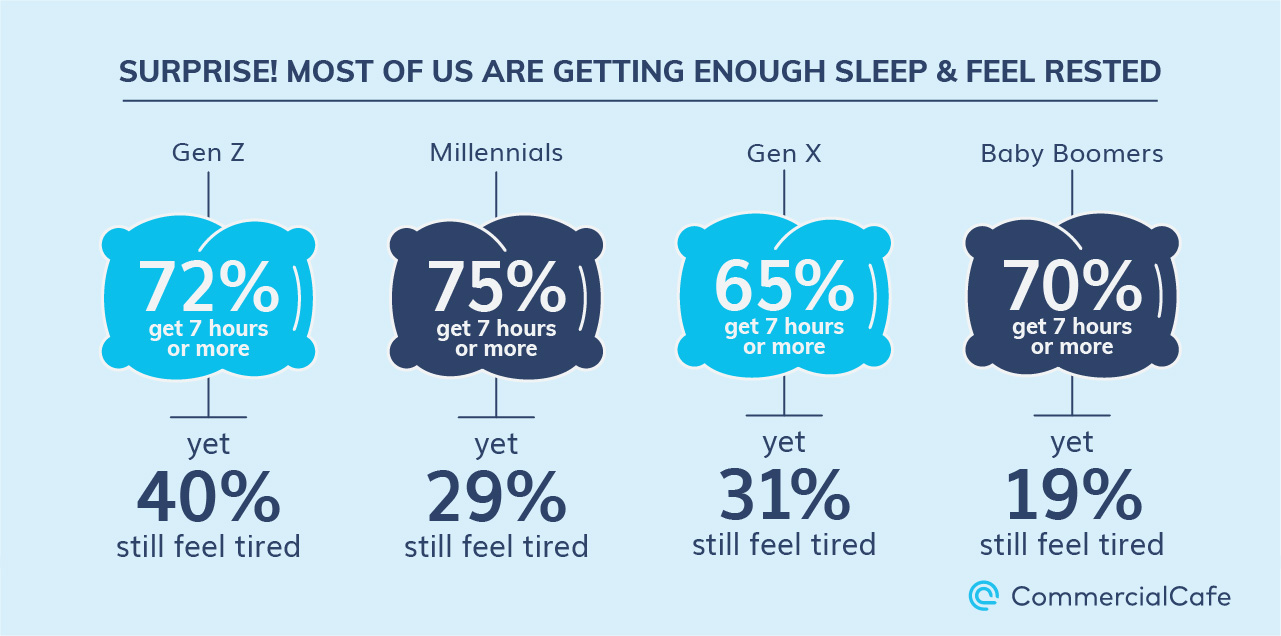
Sleep also plays a vital role in stress management. And, although it may seem like most of us never get enough, that may not be the case. Nearly three-quarters of respondents reported getting at least seven to eight hours of sleep per night. What’s even more impressive is that the same percentage of respondents also reported feeling tired only occasionally, rarely or not at all.
However, like the rest of this study, it’s not even across generational lines. It seems that a larger percentage of Gen Z isn’t sleeping as well as the other generations. To be sure, 40% of Gen Zers are still tired on most days when they wake up. By comparison, only 29% of Millennials and 31% of Gen Xers wake up tired that often, and only 19% of the low-stress Baby Boomers.
Millennials & Gen X Value Flexibility
One of the more interesting questions we asked was if respondents would accept less pay for more flexibility in their work schedule. Perhaps it always was, but flexibility seems to be important nowadays — maybe even more so than extra money — for those with families. In this case, both Millennials and Gen Xers were more likely than the other generations to make that trade — 58% and 47%, respectively — while only 32% of Gen Zers and 34% of Baby Boomers would do the same.
The ability to access local coworking spaces that allow for maximum flexibility and reduced commute times is key to ensure a good work-life balance. Whether you’re a remote worker or a freelancer looking for a professional space to meet your business needs, CommercialCafe provides you with select listings throughout all major U.S. markets:
Free Time: More Hobbies & Family Time
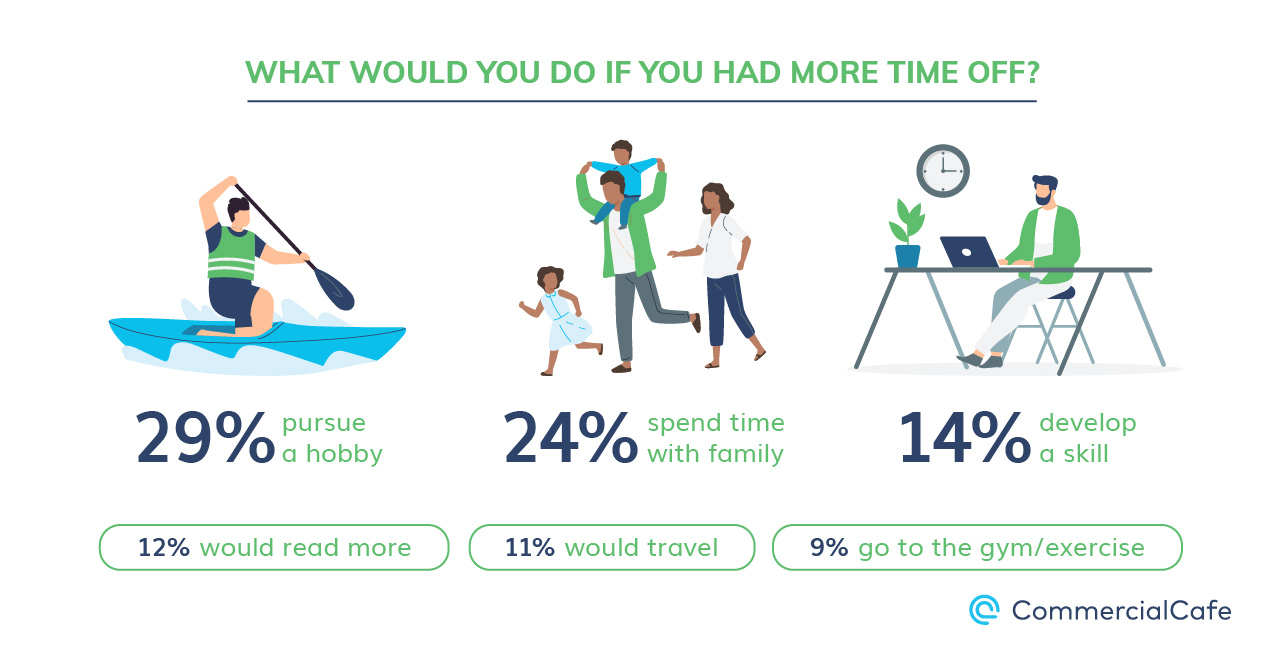
Notably, one of the more ironic parts of this survey was how respondents would spend their free time if they had more. While there is a difference between free time and destress time, they’re still closely related, and pursuing a hobby was the least-popular choice in the destressing category.
Even so, pursuing a hobby was what most respondents — around one-quarter of Millennial and Gen Xers and about one-third of Gen Zers and Baby Boomers — reported that they would do if they had more free time. Spending time with family was the second-most popular choice across all four generations, followed by developing a new skill.
Working from Home Isn’t That Great, but We Still Think it is
In another ironic twist, 59% of Gen Zers reported a better work-life balance after working from home during the pandemic — this even after they reported being more dissatisfied with their work-life balance during the pandemic. So, while working from home has helped, it hasn’t been a cure-all for the work-life balance of our youngest working generation.
The same also goes for the other generations. More than half of respondents reported some or a lot of improvement in work-life balance if they were working or could work from home.
Regardless of which generation you belong to, the pandemic has come with both expected and unexpected challenges — some larger than others. Millennials and Gen Xers are satisfied with their work from home situations overall, but schooling and occupying children during the workday can be another job in and of itself. Gen Zers are struggling more than other generations because they can’t get the interactions that initiate them into the office life and company culture. I guess the only generation that’s been steadier through this has been Baby Boomers, but then again, they’re at a larger risk of infection than the other generations.
Relationships both quality and quantity have proven to be the best treatment for hardship in this pandemic. Going forward, it will be interesting to see how they evolve in the new workplace.
Methodology
We conducted a nationwide survey of 1,549 respondents, asking them about their work-life balance. We defined the generations as following:
Baby Boomers as those born 1965 or earlier;
Gen X as those born between 1966 and 1980;
Millennials as born between 1981 and 1995;
and Gen Z as born 1996 and later.
All survey respondents were over the age of 18. Out of the participants, 19% were Gen Zers, 32% were Millennials, 26% were Gen Xers and 23% were Baby Boomers.
We used Amazon’s Mechanical Turk and the survey platform SurveyMonkey to conduct this survey. It has a 5% margin of error and a 95% confidence level.









